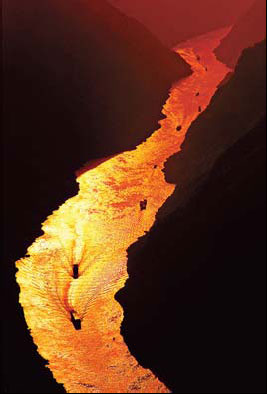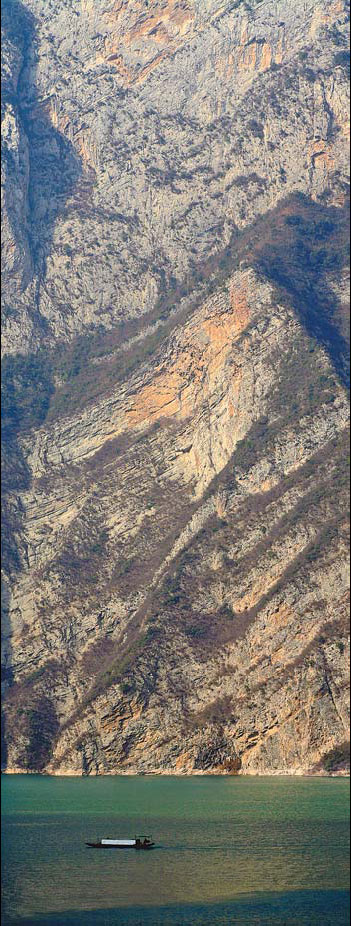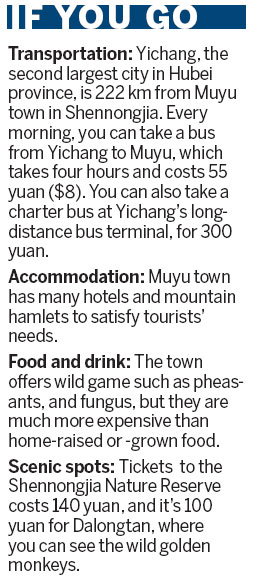|
|

Golden monkeys in Shennongjia.
|
|

Guizhou town residents hold a boat racing competition during Dragon Boat Festival.
|
|

Glorious sunset in the Xilingxia Gorge.
|
|

Members of the Tujia ethnic group perform a "maogusi" dance, which means "hairy hunters" in the Tujia language. Photos Provided to China Daily
|
|

Picturesque Xilingxia Gorge in winter.
|

Does a truly savage encounter await visitors to the mountains of Hubei province? Lu Yi finds out
Shennongjia in Central China's Hubei province attracts numerous tourists and scientists every year, thanks to legends about the mysterious "wild man". I head there, hoping to find the renowned researcher Zhang Jinxing, captain of the Rare Animal Scientific Expedition Team under the China Association for Scientific Expedition. Zhang has been living in Shennongjia's mountains since 1995.
Although I do not find him, a chance encounter with another researcher allows me to catch a glimpse of some equally fascinating primates.
Covering an area of 3,253 square kilometers, Shennongjia has four towns, four villages, a national forest park and a nature reserve, with six peaks that rise more than 3,000 meters above sea level.
When I inquire about Zhang around Muyu town, some say he has gone deep into the mountains, while others believe he is abroad.
At the office of Shennongjia Nature Reserve, which grants passes to visitors, I ask the staff if anyone there have ever seen the "wild man".
"Never. Those people who claim to have met savages might have seen bears or golden monkeys. Male golden monkeys can be over 1 meter tall and look like human beings from a distance," one worker says.
I leave Muyu town and start climbing the mountains. As I ascend, clouds gather under my feet.
At Dalongtan (Big Dragon pool), I meet Yang Jingyuan, stationmaster of Shennongjia Golden Monkey Preservation and Research Center. Like Zhang, he too has been living in the mountains for more than a decade.
He invites me into the center, a wooden bungalow, for a simple meal of roasted potatoes.
At 2,400 meters above sea level, the densely wooded area is quite cold even in summer. We warm ourselves by the fire. Stroking his beard, Yang says he has not taken a shower in months.
I ask him if it is easy to see the wild monkeys, as the rare and smart primates are known to flee when in the vicinity of humans.
"Follow me," Yang says simply and heads for the forest.
He walks so fast that I have to run to keep up. I hear him call out with a strange sound and then I find him at an opening in the woods. I am more than surprised to see a group of golden monkeys quickly moving toward us. The brave ones come within meters of us.
Some grownup males are very tall and stout. While moving in the trees, their shadows do look similar to those of humans.
"There are 105 golden monkeys in this group, including eight newborns, and we are expecting three more," Yang says.
As it is birthing time for the primates, Yang tells me not to get too close, to avoid the risk of passing on human germs to the baby monkeys.
"At other times, we just walk amid the crowd," Yang says, watching them fondly.
I wonder aloud how the wild monkeys responded so quickly to Yang's call. He explains that during the Spring Festival of 2006, just a year after the center was established, a heavy snowfall made it hard for the monkeys to forage for food.
Yang and his colleagues brought them food throughout the winter. Later, they often offered food at a fixed spot to study the monkeys' habits and characteristics.
"Gradually they came to trust us. As soon as we call them, they will come," Yang says.
Will the monkeys' survival skills become weaker if they rely on humans for food?
"Yes, but there are more than 1,000 golden monkeys in Shennongjia and other monkeys live in remote mountains.
"Offering food enables us to study and better protect them," Yang says.
Right then, his phone rings. The ring tone is the theme song of Journey to the West, a popular TV serial based on the classic novel featuring the Monkey King.
It seems the devoted researcher cannot get enough of all things monkey related.
The story first appeared in Trends Traveler magazine.
(China Daily 10/06/2010 page10)
|